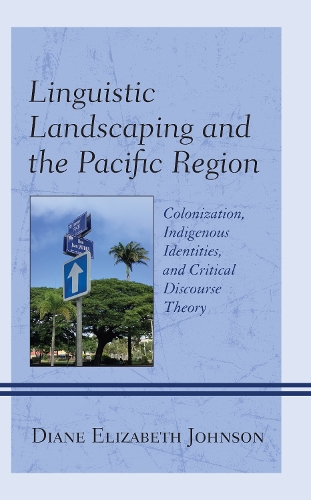
Linguistic Landscaping and the Pacific Region: Colonization, Indigenous Identities, and Critical Discourse Theory
(Hardback)
Publishing Details
Linguistic Landscaping and the Pacific Region: Colonization, Indigenous Identities, and Critical Discourse Theory
By (Author) Diane Elizabeth Johnson
Bloomsbury Publishing PLC
Lexington Books
27th July 2021
United States
Classifications
Professional and Scholarly
Non Fiction
Australasian and Pacific history
Social and cultural anthropology
306.44099
Physical Properties
Hardback
162
Width 163mm, Height 236mm, Spine 19mm
426g
Description
In Linguistic Landscaping and the Pacific Region: Colonization, Indigenous Identities, and Critical Discourse Theory, Diane Elizabeth Johnson provides four case studies, each exploring the use of language in public spaces in an area of the Pacific in which colonization has played a major role: Hawaii, Aotearoa/ New Zealand, New Caledonia, and Tahiti. Each of these studies is informed by critical discourse theory, a theory which highlights the ways in which hegemonic structures may be established, reinforced, and particularly in times of crisiscontested and overturned. The book introduces the case studies in the context of a parallel introduction to the Pacific region, critical discourse theory, and research on linguistic landscapes. The critical discussion is accessible to students and others who are approaching these contexts and theories for the first time, while also providing locating the authors work in relation to existing scholarship. Johnson urges readers to listen carefully to the voices of indigenous peoples at a time when the danger of Western certainties has been fully exposed.
Reviews
"This book brings together an excellent collection of studies on the linguistic landscape of several Pacific nations and their peoples. It reflects on the impact of colonization and discusses how a colonized people 'struggle to assert their voices in the face of dominant colonial authorities and ideologies.' The author has cleverly used the linguistic landscape to showcase the determination of these Pacific nations and peoples to reclaim what has almost been lost. An insightful and thought provoking read."
-- Sophie Nock, Ngti Kur, University of Waikato"Johnson offers a brilliant and intriguing theory of the significance of Indigenous languages from an interdisciplinary approach. Through her definition of linguistic landscape, the author engages the reader in critical discussions of the correlations between the concept of traditional Indigenous lands and the historical attempts of European colonization. An inspiring component of the book is Johnsons examination of the role Indigenous languages have played in contemporary public demonstrations for the protection of sacred lands and other acts of resistance. This book confirms how language is a major weapon for Indigenous empowerment. An excellent resource to the field of Indigenous studies."
-- Deirdre A. Almeida, Eastern Washington UniversityAuthor Bio
Diane Elizabeth Johnson was lecturer at The University of Waikato.
